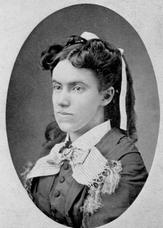
We are entering into the holiday season which means the Lottie Moon Christmas offering is right around the corner. I’ve known about the Lottie Moon offering for as long as I can remember. It has been an important part of Christmas my entire life. But who exactly is Lottie Moon?
Lottie Moon has become something of a legend to us. But in her time Lottie was anything but an untouchable hero. In fact, she was like today's missionaries. She was a hard-working, deep-loving Southern Baptist who labored tirelessly so her people group could know Jesus.
Throughout her career, Lottie Moon wrote numerous letters home, urging Southern Baptists to greater missions involvement and support. One of those letters triggered Southern Baptists' first Christmas offering for international missions - enough to send three new missionaries to China.
Born Charlotte Digges Moon December 12, 1840, in Albemarle County, Va. Lottie rebelled against Christianity until she was in college. In December 1858, she came to faith in Christ and was baptized at First Baptist Church of Charlottesville, Va. Lottie attended Albemarle Female Institute, female counterpart to the University of Virginia. In 1861, she was one of the first women in the South to receive a master's degree. Lottie stayed close to home during the Civil War but eventually taught school in Kentucky, Georgia and Virginia.
Edmonia Moon, Lottie's sister, was appointed to Tengchow, China, in 1872. The following year, Lottie was appointed and joined her sister there. Lottie served 39 years as a missionary, mostly in China's Shantung province. She taught in a girls' school and often made trips into China's interior to share the good news with women and girls.
Lottie frequently wrote letters to the United States, detailing Chinese culture, missionary life and the great physical and spiritual needs of the Chinese people. Additionally, she challenged Southern Baptists to go to China or give so that others could go. By 1888, Southern Baptist women had organized and helped collect $3,315 to send workers needed in China. Lottie died aboard a ship in the Japanese harbor of Köbe on Dec. 24, 1912. She was 72 years old. In 1918, Woman's Missionary Union (WMU) named the annual Christmas offering for international missions after the woman who had urged them to start it.
"Why should we not ... instead of the paltry offerings we make, do something that will prove that we are really in earnest in claiming to be followers of him who, though he was rich, for our sake became poor?"
- Lottie Moon
Lottie Moon has become something of a legend to us. But in her time Lottie was anything but an untouchable hero. In fact, she was like today's missionaries. She was a hard-working, deep-loving Southern Baptist who labored tirelessly so her people group could know Jesus.
Throughout her career, Lottie Moon wrote numerous letters home, urging Southern Baptists to greater missions involvement and support. One of those letters triggered Southern Baptists' first Christmas offering for international missions - enough to send three new missionaries to China.
Born Charlotte Digges Moon December 12, 1840, in Albemarle County, Va. Lottie rebelled against Christianity until she was in college. In December 1858, she came to faith in Christ and was baptized at First Baptist Church of Charlottesville, Va. Lottie attended Albemarle Female Institute, female counterpart to the University of Virginia. In 1861, she was one of the first women in the South to receive a master's degree. Lottie stayed close to home during the Civil War but eventually taught school in Kentucky, Georgia and Virginia.
Edmonia Moon, Lottie's sister, was appointed to Tengchow, China, in 1872. The following year, Lottie was appointed and joined her sister there. Lottie served 39 years as a missionary, mostly in China's Shantung province. She taught in a girls' school and often made trips into China's interior to share the good news with women and girls.
Lottie frequently wrote letters to the United States, detailing Chinese culture, missionary life and the great physical and spiritual needs of the Chinese people. Additionally, she challenged Southern Baptists to go to China or give so that others could go. By 1888, Southern Baptist women had organized and helped collect $3,315 to send workers needed in China. Lottie died aboard a ship in the Japanese harbor of Köbe on Dec. 24, 1912. She was 72 years old. In 1918, Woman's Missionary Union (WMU) named the annual Christmas offering for international missions after the woman who had urged them to start it.
"Why should we not ... instead of the paltry offerings we make, do something that will prove that we are really in earnest in claiming to be followers of him who, though he was rich, for our sake became poor?"
- Lottie Moon
 RSS Feed
RSS Feed